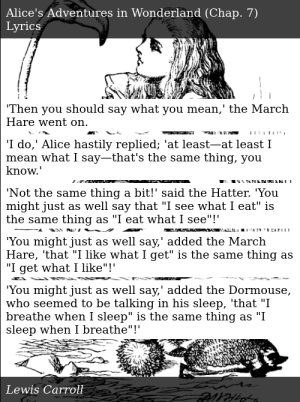Have we completely abandoned the idea that words have meaning?
In a previous essay, I asked the following questions about the authors of the Great Barrington Declaration (GBD), who routinely claim to be “censored” despite their enormous media footprint and direct access to and influence over our most powerful politicians.
How can “muzzled” people be so loud? How can “censored” people be so ubiquitous? How have the GBD authors simultaneously been able to influence the country’s most powerful leaders and also been deprived of a “fair hearing”? Aren’t “silenced” people, supposed to be, well, silent? Have we completely abandoned the idea that words have meaning?
I am now prepared to answer the last of these questions. Yes, some people have completely abandoned the idea that words have meaning.
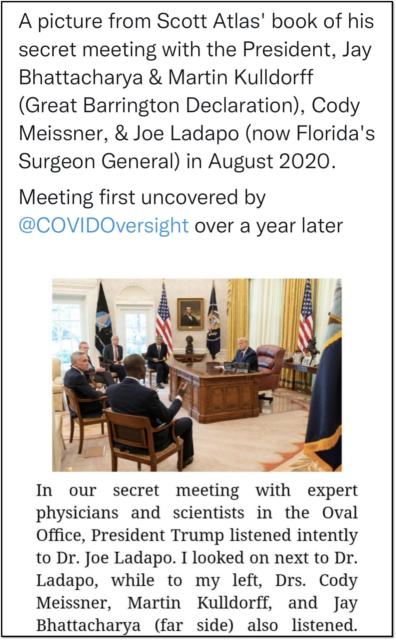
“The extraordinary measures I advocated was not lockdown, but rather a rapid seroprevalence study and a focused protection approach”
To further explain, I will reference another previous essay in which I quoted from an article by Drs. Eran Bendavid and Jay Bhattacharya titled Is the Coronavirus as Deadly as They Say? published in March 2020. In particular, I quoted the following sentence they wrote and made it the title of my article.
If it’s true that the novel coronavirus would kill millions without shelter-in-place orders and quarantines, then the extraordinary measures being carried out in cities and states around the country are surely justified.
Though this seems entirely straight forward, to provide further context for this statement, I added the following,
Though he was clear that mass death would justify lockdowns, at the time he felt “there’s little evidence to confirm that premise” that COVID-19 could kill millions and that “projections of the death toll could plausibly be orders of magnitude too high.” He wrote that “if we’re right about the limited scale of the epidemic, then…A universal quarantine may not be worth the costs it imposes on the economy, community and individual mental and physical health.” Simply put, Dr. Bhattacharya was against lockdowns at the start of the pandemic because he didn’t feel COVID-19 would be that bad. He wrote, that “a 20,000-40,000-death epidemic is a far less severe problem than one that kills two million”, and that early estimates of mass death were “deeply flawed.”
Dr. Bhattacharya responds
Recently, Dr. Bhattacharya responded to an inquiry about my article on social media. The questioner asked if he indeed wrote that “If it’s true that the novel coronavirus would kill millions without shelter-in-place orders and quarantines, then the extraordinary measures being carried out in cities and states around the country are surely justified.”
Dr. Bhattacharya’s response was rather revealing. He said that,
I wrote that sentence in the WSJ piece. But the extraordinary measures I advocated was not lockdown, but rather a rapid seroprevalence study and a focused protection approach. The people who keep that blog you show are lockdowners & have slandered me throughout the epidemic… They excel in taking quotes out of context and spinning false conspiracy stories about funding.
And there it is. Words have no meaning.
A sad pattern
This is pathetic, but hardly surprising. As is typical for contrarian doctors sheltered from the consequences of their words, Dr. Bhattacharya has a long pattern of such linguistic gymnastics.
- After COVID-19 killed at least 349 children and the flu just one child, he said that “Very few healthy, young children died from this virus, more died from the flu last year.”
- Though he claims to speak for “the working class” in opposition to “the laptop class”, he experienced the pandemic from behind a computer screen rather than a patient’s beside. I’d be happy to tell him a bit about what it’s been like. He can tell me what it’s like to star in YouTube videos.
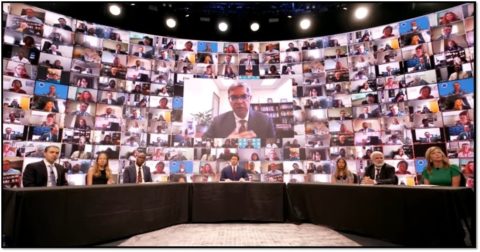
- Even though he instructed others to “resume life as normal“, he wisely managed to avoid the virus until August 2021, after he had been vaccinated.
- Though he bristles at any suggestion he is anti-vaccine, he’s routinely opposes vaccinating children and helped influence Florida’s horrible decision to encourage healthy children to get the virus rather the vaccine. In an article called “The Ill-Advised Push to Vaccinate the Young” he even wrote, “The idea that everyone must be vaccinated against COVID-19 is as misguided as the anti-vax idea that no one should. The former is more dangerous for public health.” All of this is, of course, anti-vaccine. If you don’t believe me, test yourself here.
- Even though he constantly talks about COVID-19 and only COVID-19, he said in September 2021, “The emergency phase of the disease is over. Now, we need to work very hard to undo the sense of emergency. We should be treating covid as one of 200 diseases that affect people.”
- He said that Florida had “protected the vulnerable” right before the Delta variant ripped through the state killing more people than ever before.
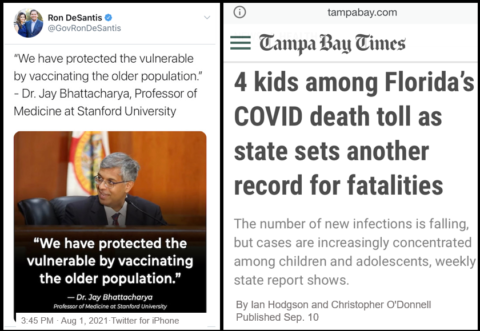
‘When I use a word, it means just what I choose it to mean–neither more nor less.”
If you feel you are in Through the Looking Glass, you’re not alone. In that absurd world, running allows one to remain stationary and moving away from something brings one closer to it. In Dr. Bhattacharya’s absurd world:
- It is slander to accurately quote Dr. Bhattacharya.
- Providing context for his quotes is “taking quotes out of context.”
- “Shelter-in-place orders and quarantines” really mean “a rapid seroprevalence study and a focused protection approach”.
- Being “muzzled” means private meetings with the President of the United States and the Governor of Florida, directly influencing their COVID response.
- 1 is larger than 349.
- Resuming “life as normal” means avoiding COVID for 1.5 years, until after he had been vaccinated.
- Being “pro-vaccine” means vocally opposing vaccines.
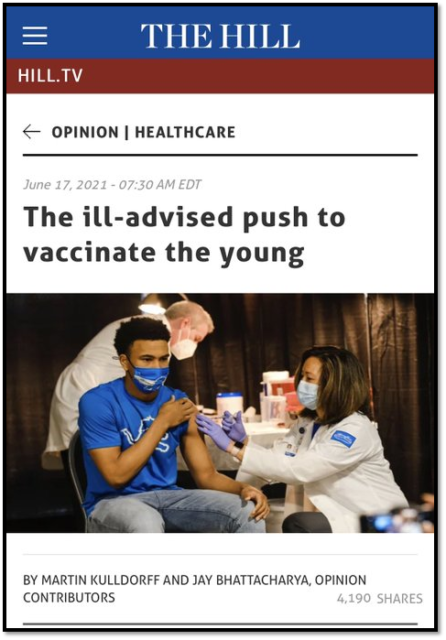
- “Treating covid as one of 200 diseases that affect people” means talking exclusively about COVID.
- Protecting vulnerable people means they die in record numbers.
- A member of the laptop class has authority to speak on behalf of doctors who work in hospitals, many of whom feel he’s made their job much harder.
In claiming words mean whatever he wants them to mean, Dr. Bhattacharya is channeling the character of Humpty Dumpty who had this memorable exchange with Alice.
‘…and that shows that there are three hundred and sixty-four days when you might get un-birthday presents––’
‘Certainly,’ said Alice.
‘And only one for birthday presents, you know. There’s glory for you!’
‘I don’t know what you mean by “glory”,’ Alice said.
‘Humpty Dumpty smiled contemptuously. ‘Of course you don’t–till I tell you. I meant “there’s a nice knock-down argument for you!”‘
‘But “glory” doesn’t mean “a nice knock-down argument”, Alice objected.
‘When I use a word,’ Humpty Dumpty said in rather a scornful tone, ‘it means just what I choose it to mean–neither more nor less.’
‘The question is,’ said Alice, ‘whether you can make words mean different things–that’s all.’
‘The question is,’ said Humpty Dumpty, ‘which is to be master–that’s all’
Alice was too much puzzled to say anything; so after a minute Humpty Dumpty began again. ‘They’ve a temper, some of them — particularly verbs: they’re the proudest — adjectives you can do anything with, but not verbs — however, I can manage the whole lot of them! Impenetrability! That’s what I say!’
‘Would you tell me please,’ said Alice, ‘what that means?’
‘Now you talk like a reasonable child,’ said Humpty Dumpty, looking very much pleased. ‘I meant by “impenetrability” that we’ve had enough of that subject, and it would be just as well if you’d mention what you mean to do next, as I suppose you don’t mean to stop here all the rest of your life.’
‘That’s a great deal to make one word mean,’ Alice said in a thoughtful tone.
‘When I make a word do a lot of work like that,’ said Humpty Dumpty, ‘I always pay it extra.’
This word-play is all very amusing when it comes from nonsensical characters in a work of fantasy.
It’s not so cute when it comes from a highly-credentialed scientist at a prestigious university who has greatly influenced our disastrous pandemic response. Words have meaning. People should say what they mean and mean what they say.
